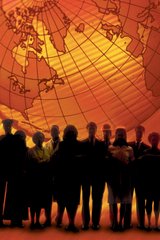COLUMBUS, Ohio — In wide-ranging remarks here, Justice Ruth Bader Ginsburg defended the use of foreign law by American judges, suggested that torture should not be used even when it might yield important information and reflected on her role as the Supreme Court’s only female justice. The occasion was a symposium at the Moritz College of Law at Ohio State University honoring her 15 years on the court.

Justice Ruth Bader Ginsburg on Friday at Ohio State University, where she talked freely about her work, past and present.
“I frankly don’t understand all the brouhaha lately from Congress and even from some of my colleagues about referring to foreign law,” Justice Ginsburg said in her comments on Friday.
The court’s more conservative members — Chief JusticeJohn G. Roberts Jr. and Justices Samuel A. Alito Jr.,Antonin Scalia and Clarence Thomas — oppose the citation of foreign law in constitutional cases.
“If we’re relying on a decision from a German judge about what our Constitution means, no president accountable to the people appointed that judge and no Senate accountable to the people confirmed that judge,” Chief Justice Roberts said at his confirmation hearing. “And yet he’s playing a role in shaping the law that binds the people in this country.”
Justice Ginsburg said the controversy was based on the misunderstanding that citing a foreign precedent means the court considers itself bound by foreign law as opposed to merely being influenced by such power as its reasoning holds.
“Why shouldn’t we look to the wisdom of a judge from abroad with at least as much ease as we would read a law review article written by a professor?” she asked.
She added that the failure to engage foreign decisions had resulted in diminished influence for the United States Supreme Court.
The Canadian Supreme Court, she said, is “probably cited more widely abroad than the U.S. Supreme Court.” There is one reason for that, she said: “You will not be listened to if you don’t listen to others.”
She also offered a theory about why after World War II nations around the world started to create constitutional courts with the power to strike down legislation as the United States Supreme Court has.
“What happened in Europe was the Holocaust,” she said, “and people came to see that popularly elected representatives could not always be trusted to preserve the system’s most basic values.”
American hostility to the consideration of foreign law, she said, “is a passing phase.” She predicted that “we will go back to where we were in the early 19th century when there was no question that it was appropriate to refer to decisions of other courts.”
Justice Ginsburg turned 76 last month and underwent surgery for pancreatic cancer in February. Here on Friday, she was energetic, enthusiastic and characteristically precise in her answers to questions from two law professors in a 90-minute conversation. She spoke mostly about her career as a litigator specializing in women’s rights and her years on the court.
In a videotaped tribute, Chief Justice Roberts described Justice Ginsburg’s work habits — including her “total disregard for the normal day-night work schedule adhered to by everyone else since the beginning of recorded history” — and congratulated her for reaching what he said was the midpoint of her career on the court.
In her remarks, Justice Ginsburg discussed a decision by the Israeli Supreme Court concerning the use of torture to obtain information from people suspected of terrorism.
“The police think that a suspect they have apprehended knows where and when a bomb is going to go off,” she said, describing the question presented in the case. “Can the police use torture to extract that information? And in an eloquent decision by Aharon Barak, then the chief justice of Israel, the court said: ‘Torture? Never.’ ”
The message of the decision, Justice Ginsburg said, was “that we could hand our enemies no greater victory than to come to look like that enemy in our disregard for human dignity.” Then she asked, “Now why should I not read that opinion and be affected by its tremendous persuasive value?”
Justice Ginsburg also discussed her career as an advocate, one that included six Supreme Court arguments and a role in shaping the language of the law. She helped introduce the term “gender discrimination” as a synonym for “sex discrimination,” she said, explaining that her secretary had proposed the idea while typing a brief to be submitted to male judges.
“ ‘The first association of those men with the word “sex” is not what you’re talking about,’ ” the secretary said, Justice Ginsburg recalled. “ ‘Why don’t you use a grammar-book term? Use gender. It has a neutral sound, and it will ward off distracting associations.’ ”
Justice Ginsburg expressed dismay at being the only woman on the Supreme Court. “There I am all alone,” she said, “and it doesn’t look right.”
In this area, too, the Canadian Supreme Court provides a model, Justice Ginsburg said. That nine-member court has four women, including its chief justice.
Justice Ginsburg concluded her remarks with advice to the students in the audience about one of her great passions.
“For a first opera, I would say, pick ‘Butterfly’ or ‘Bohème,’ ” she said. For her part, she added, she was looking forward a little warily to a six-hour production of Wagner’s “Siegfried.”
“Wagner is a great, great composer,” she said, “but he needed a good editor.”

